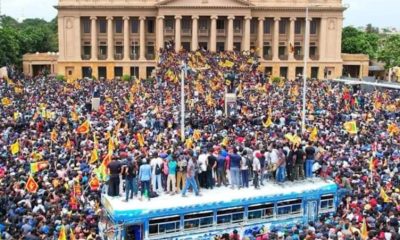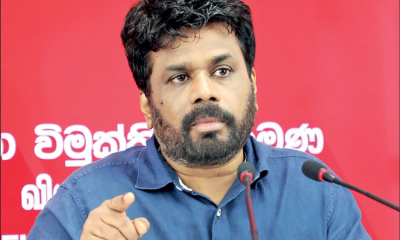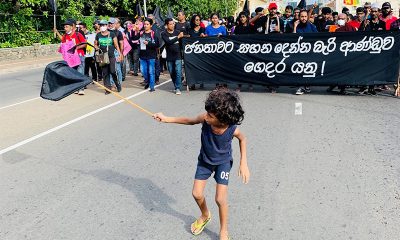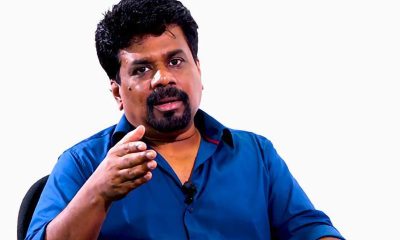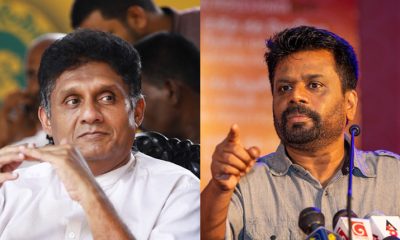Editorial
Readying for the big fight

The week that passed saw considerable political activity related to the forthcoming presidential election that must be held late next year in accordance with the constitution. Connected events included business magnate Dhammika Perera’s declaration that he is willing to run for president provided the political parties – he did not identify which parties though he said they included the SLPP – guarantee him 51 percent of the vote. Perera is no spring chicken not to know that no party nor anybody else can “guarantee” anybody a proportion of the vote. That must await the polling and the counting of the votes. The second event was the launching of Dilith Jayaweera’s new Mawbima Janatha Pakshaya (MJP) which opened its new party office in Colombo.
Neither Jayaweera nor Perera have declared themselves as candidates for the forthcoming presidential election. The only declared candidates up to now are Opposition and Samagi Jana Balawegaya (SJB) leader Sajith Premadasa and Anura Kumara Dissanayake of the JVP/NPP. Both Jayaweera and Perera have been staunch supporters of disgraced former President Gotabaya Rajapaksa. The Aragalaya-fuelled ejection of GR from the presidency he won comfortably in November 2019 propelled incumbent President Ranil Wickremesinghe into the hot seat. As is very well know, Wickremesinghe lost his own parliamentary seat in the parliamentary election that followed next August and led the UNP to stunning zero elected seats at that contest. Yet he entered the legislature through the UNP’s single National List seat and was anointed by Gotabaya first to succeed brother, Mahinda as premier and then GR himself as president.
All that, of course, is so much water that has passed under the bridges. Asked if he was a potential presidential candidate in November 2024, Jayaweera said at his party office opening: “First, we will give enough time of the MJP to succeed as a political movement across the country and then decide when to run for political office.” Perera, at a posh Nelumpokuna show in Colombo last week, declared that he does not invest in unwinnable projects. “I’m trying to unite a country divided by politics through education,” he said at this event celebrating the fourth anniversary of DP Education. Incidentally, DP stands not for Dhammika Perera but for Dhammika and Priscilla (Perera) Foundation which has already reached out to a claimed 1.5 million students enrolled in its programme which imposes no cost on the beneficiaries.
While Ranil Wickremesinghe has not declared himself as a candidate at the next presidential election, it is very clear that he is aspiring to an elected presidency. Much of what he says and does reflects that ambition. The SLPP which elected RW to office, and is keeping him there, is on record saying that it will field a candidate but it is very coy about who that will be. Pressed at news briefings it says that it will reveal the name “at the right time.
” Some SLPP parliamentarians have already expressed their support for RW. SLPP General Secretary Sagara Kariyawasam, widely considered to be the voice of Basil Rajapaksa, asked last week about the kite that Dhammika Perera has flown, responded that Dhammika is a valued member of their party. Several potential candidates are ambitious about running for president, and Dhammika being one of them is not a breach of party discipline. However, the SLPP has not decided on a candidate.
Political observers and commentators are of the view that more important than who the candidates will be next year is whether the election will be held on schedule in less than a year from now. According to Prof. GL Peiris, polling must be by September though GR’s term, which RW is serving out, would end only in November, But recent reports and statements that the government is looking at changes in the electoral system giving direct election (160 seats) a greater weight than the number elected by proportional representation (65 seat).
Justice Minister Wijeyadasa Rajapakshe has already presented a cabinet paper to this effect and a cabinet sub-committee going into it. This has triggered fears in political circles about an attempt to postpone elections. Such fears are legitimate in the context of the postponement sine die of the local election after nominations were accepted as well as elections to Provincial Councils.
A senior political analyst commented that in any society undergoing economic shock therapy that Sri Lanka is, it is vital that the safety valves be opened on schedule and that the public’s hope of a chance for change will not be frustrated. If next year’s presidential election is the earliest scheduled chance for a change, any experiment with the election laws should not be of a sort that defers the holding of that election. Our political history clearly proves that any blocking, retarding or distortion of the electoral calendar and/or process leads to violent upheavals.
Whether the SLPP will throw its weight behind Dhammika Perera, will remain with Ranil Wickremesinghe who arrested last year’s anarchy and restored a sense of normalcy – though at the cost of not repaying the country’s debt – or play a wild card will remain an open question certainly in the short term. The JVP/NPP has been demonstrating tight organization and growing support.
But it must be remembered that at the 2019 presidential election, Anura Kumara Dissanayake polled only 3.16% of the vote against Sajith Premadasa’s 41.99%. Undoubtedly both these candidates will pick-up SLPP votes next time round after GR destroyed his party’s rural agricultural base. Extensive Rupavahini publicity Dhammika Perera’s DP Education anniversary received last week demonstrates he’s not without government backers.
Editorial
Curtains for Mexican drug cartel boss

Tuesday 24th February, 2026
The Mexican military on Sunday killed a drug lord, described as the most powerful cartel leader in Mexico. Nemesio Ruben Oseguera Cervantes aka El Mencho perished in a clash with the Mexican armed forces backed by US intelligence. Mencho was known the world over for his well-established drug distribution network. Members of the slain criminal’s cartel went berserk, torching vehicles and fuel stations in several parts of Mexico. They also blocked some highways with burning vehicles.
Mexican President Claudia Sheinbaum praised the armed forces for the successful operation. It is hoped that military operations will continue until the violent gangs are neutralised once and for all. There is no future for a country that is in the clutches of drug barons and terrorists.
Mexico is now doing, on President Sheinbaum’s watch, what it should have done decades ago. Mexico has been home to several powerful drug cartels, such El Mencho’s CJNG (Jalisco New Generation Cartel), Sinaloa Cartel, Beltran -Leyva Organisation and Los Zetas. They have been in the news globally, and their narcotic operations have affected the entire world. CJNG has a global network, which distributes dangerous drugs, such as fentanyl, methamphetamine, cocaine and heroin. Among the powerful cartel leaders, killed by the Mexican military during the past several decades, was Torres Felix; he was shot dead in 2012. However, there has never been an all-out war on drugs as such in Mexico.
One may recall that President Felipe Calderón sent the Mexican military into the cartel-controlled regions in 2006, marking an escalation in Mexico’s approach to the drug menace, but the narcotic cartels have been far from weakened. That operation made international headlines. If successive Mexican governments had taken on the drug cartels with might and main, perhaps the likes of El Mencho would not have emerged so powerful as to raise well-equipped private armies and run parallel governments.
Successful military operations against powerful drug cartels in Mexico, etc., stand all countries in good stead, for they lead to a decrease in the international narcotics supply. Sri Lanka has been a victim of foreign drug cartels that operate through local agents, most of whom are based in Dubai and other havens for criminals. The incumbent government has embarked on a campaign to rid the country of the scourge of narcotics, and operations during the past one and a half years or so have yielded a lot of banned substances and helped net some powerful drug dealers. These operations must go on.
The local underworld is controlled by drug barons and their hit squads have demonstrated their ability to strike at will. A soldier-turned Sicario, arrested over the recent double murder near the Tri-forces Headquarters complex in Akuregoda, is alleged to have committed 10 murders. He has been working for a drug lord residing overseas. There are many other such hitmen in the pay of drug barons, and all of them must be hunted down to make this country safe.
In 2020, while being detained in the Boosa Prison, Podi Lassi and two other drug dealers, known as Kosgoda Tharaka and Pitigala Keuma threatened to harm the then President Gotabaya Rajapaksa, Defence Secretary General Kamal Gunaratne, and some senior prison officers. They bragged that although they were behind bars, their hit squads were out there and ready to carry out their orders. Such is their power.
In September 2023, Nadun Chinthaka Wickremaratne alias Harak Kata almost made good his escape during an interrogation session at the CID headquarters. His plan to poison the police personnel on duty, and flee went pear-shaped thanks to some Argus-eyed STF personnel. It was subsequently revealed that Harak Kata had planned to use several commandos in the rescue operation. In November 2023, a military sniper was taken into custody for his alleged involvement in the plot to spring free Harak Kata and Kudu Salindu from the CID. A Lt. Colonel of the Army Commando Regiment was arrested for supplying ammunition to drug dealer Kehelbaddara Padme’s bodyguard, ‘Commando Salintha’. Besides, more than a dozen Police Narcotics Bureau officers were arrested in 2020 over their links to drug dealers. This shows how well established the drug Mafia in this country is.
Minister of Public Security Ananda Wijepala, revealing the progress in investigations into the Akuregoda double murder and fielding questions from the Opposition, in Parliament, the other day, claimed one of the Opposition local councillors in the Southern Province had underworld links. Narcotics and politics are conjoined twins. Drug dealers are known to lavish funds on politicians and manipulate them. Hence, the need for thorough background checks to be conducted on all people’s representatives. Most of all, it needs to be found out whether there is any truth in the allegation that notorious drug dealer in exile, Kudu Lal, sponsors some local councillors in Colombo, and influenced the outcome of a mayoral election, with their help.
Editorial
Coal scam: Will Opp. drop a sitter?

Monday 23rd February, 2026
The JVP-NPP government is in overdrive trying to defend the indefensible. Its MPs and propagandists are all out to mislead the public into believing that the procurement of coal from a new company for the Norochcholai power plant has been free from malpractice. Theirs is a Sisyphean task. The Opposition has produced a recent report issued by the Ceylon Electricity Board (CEB) to support its argument that the last eight shiploads of coal were low quality and have caused huge losses to the state coffers.
The government has trotted out an absurd excuse for procuring low-grade coal; it says the coal supplier has been fined for the substandard coal stocks. The errant company has thus been allowed to continue to supply low-quality coal, which cannot be sold to any other country, and make huge profits even after paying fines so that its owners and the corrupt Sri Lankan politicians who manipulated the tender process in favour of it can laugh all the way to the bank. What the government politicians and their propaganda hitmen conceal from the public is that coal with a calorific value below the permissible floor must be rejected outright, and it is illegal for such low quality coal to be procured under any circumstances. Otherwise, all low-quality, unsaleable coal in the world will be dumped here, and the supplier will not mind paying fines because it can still make profits.
SLPP MP D.V. Chanaka has told Parliament that only 107 metric tons of coal are usually required per hour to generate 300 megawatts of electricity, but now as many as 120 metric tons of newly imported coal have to be burnt to produce the same amount of power. Thus, about 13 extra metric tonnes of coal are required per hour due to the scam, according to Chanaka, who has said tests have revealed that the calorific value of newly imported coal shipments ranged from 5,600 and 5,800 kilocalories per kilogram (kcal/kg) although under the coal tender guidelines, the minimum required calorific value is 5,900 kcal/kg. Now, the CEB will have to use more coal to produce the required amount of power or burn diesel to meet the shortfall. Either way, the CEB will suffer massive losses, which will be conveniently passed on to the public. It has already asked for a 13.56% power tariff hike.
There is a prima facie case of fraudulent procurement of coal, which must not go uninvestigated. Former Ministers have been incarcerated for less serious offences, such as obtaining fuel allowances fraudulently and politcally motivated distribution of carrom boards, etc., ahead of a presidential election. Another former minister and his sons are being held on remand for misusing a state-owned truck among other things. So, there is no way the JVP-NPP government, which pontificates to others about the virtues of good governance and claims to be on a crusade against corruption, can refuse to institute legal action against those responsible for the mega coal scam.
Meanwhile, the Opposition should seriously consider sacking its advisors and strategists. Surprisingly, it has not moved a vote of no confidence against Energy Minister Kumara Jayakody, giving the government a choice between throwing him to the wolves and defending him. The JVP/NPP is very likely to make the same mistake as its immediate predecessor, the SLPP-UNP regime, which defended the then Health Minister Keheliya Rambukwella when a motion of no faith was moved against him over the procurement of fake immunoglobulin, etc. In doing so, that administration demonstrated that it had no qualms about defending the corrupt, and incurred much public wrath, which found expression in a massive protest vote against it. The SJB-led Opposition can use a no-confidence vote to expose the self-righteous JVP-NPP government for shielding the corrupt. The coal scam is a sitter, so to speak. Will the Opposition drop it?
Editorial
Anger wells up as people queue up

A shortage of cooking gas has affected several areas, where there are long lines of people near gas sales points. These scenes evoke one’s dreadful memories of winding queues for essential commodities in 2022. The two situations however do not bear comparison in that the country had no forex for petroleum imports in 2022 whereas there is no such problem at present; the gas shortage is mainly due to supply mismanagement.
The LP gas shortage has gladdened the hearts of the Opposition politicians immensely. They have got hold of something to beat the government with. They are making the most of the issue and urging the government to ensure an uninterrupted gas supply. Having failed to secure enough popular support to win elections, they are apparently deriving some perverse pleasure from the people’s predicament. In 2022, the then Opposition, including the JVP, used public resentment, which stemmed from shortages of essentials and long queues, to fuel their political projects and oust President Gotabaya Rajapaksa. The JVP went on to garner favour with the irate public and capture state power.
The JVP-NPP government is taking great pains to deny the obvious. On Friday, the ruling party frontbenchers went ballistic in Parliament, berating the Opposition for making what they termed a false claim that there was a gas shortage. They are far removed from reality. If they care to look around, they will see long lines of people near gas sales points in some areas. They had better come to terms with reality and sort out the gas shortage, which shows signs of worsening.
The Consumer Affairs Authority (CAA) has sought to make light of the gas shortage. It has been making political statements in defence of the government, instead of taking action to safeguard the interests of consumers. It has urged the public not to stock up on cooking gas. It has also claimed that the state-owned gas company, Litro, has had to meet a shortfall in the gas supply caused by the failure of Laugfs to cater to its consumers. The CAA needs to be told that there is no way the public can hoard cooking gas. They cannot store more LP gas than the cylinders in their possession can hold. It is next to impossible to purchase new cylinders to hoard gas. Litro also does not supply gas to Laugfs consumers using yellow cylinders, and therefore it does not have to release more gas into the market to meet a Laugfs gas supply shortfall.
The government insists that Litro has enough gas stocks. If so, why doesn’t it order Litro to increase the supply and end the gas shortage forthwith? The Opposition has said the gas shortage has come about as the government awarded the contract for supplying LP gas to a new company. One may recall that speaking in Parliament in December 2025, Opposition MP Chamara Sampath Dassanayake warned of a possible gas shortage in February. He said the government in its wisdom had contracted a new gas supplier who was not capable of ensuring a reliable supply. Former Minister Champika Ranawaka has said the government had to change the supplier in keeping with the conditions the US laid down for reducing the so-called Trump tariffs on Sri Lankan exports. The government has chosen to remain silent on these claims. An explanation is called for. If it is true that the new supplier is not equal to the task of ensuring a steady supply of LP gas, the government will have its work cut out to eliminate gas shortages and queues and prevent public anger from welling up.
People’s aversion to shortages of essentials and queues knows no bounds. It was one of the reasons for the crushing defeat the SLFP-led United Front government suffered in 1977. It also became the undoing of Gotabaya Rajapaksa’s presidency in 2022. Aragalaya, which developed into a massive protest campaign, started off as a series of agitations against fuel and milk food shortages, in urban areas. People did not have to take to the streets in 2022; they were already there waiting in winding queues. The situation is obviously not so bad at present, but anything is possible in politics. It is a big mistake for a government to take public resentment for granted.
-

 Features3 days ago
Features3 days agoWhy does the state threaten Its people with yet another anti-terror law?
-

 Features3 days ago
Features3 days agoReconciliation, Mood of the Nation and the NPP Government
-

 Features3 days ago
Features3 days agoVictor Melder turns 90: Railwayman and bibliophile extraordinary
-

 Features2 days ago
Features2 days agoLOVEABLE BUT LETHAL: When four-legged stars remind us of a silent killer
-

 Features3 days ago
Features3 days agoVictor, the Friend of the Foreign Press
-

 Latest News4 days ago
Latest News4 days agoNew Zealand meet familiar opponents Pakistan at spin-friendly Premadasa
-

 Latest News4 days ago
Latest News4 days agoTariffs ruling is major blow to Trump’s second-term agenda
-

 Latest News4 days ago
Latest News4 days agoECB push back at Pakistan ‘shadow-ban’ reports ahead of Hundred auction


